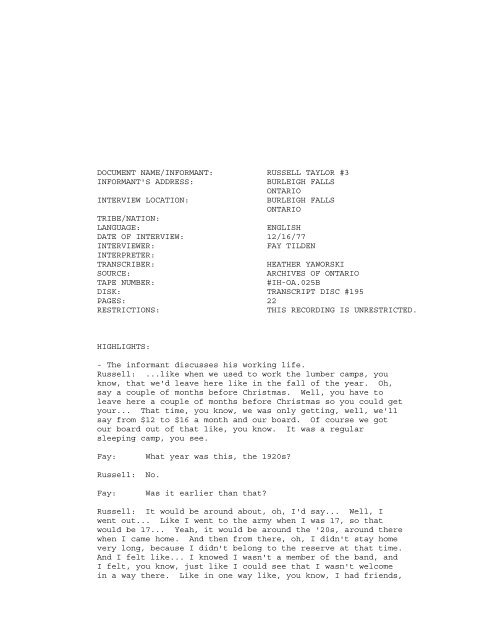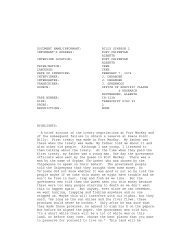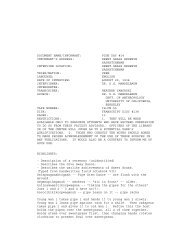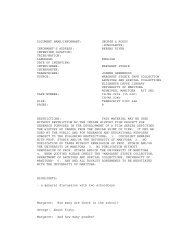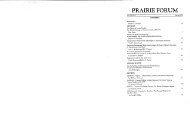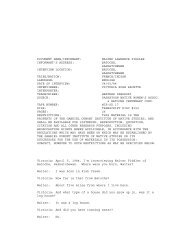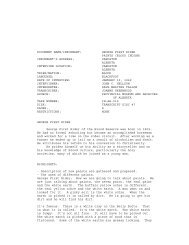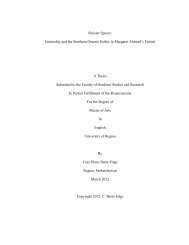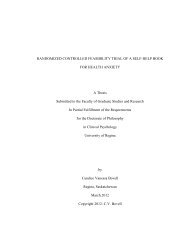Create successful ePaper yourself
Turn your PDF publications into a flip-book with our unique Google optimized e-Paper software.
DOCUMENT NAME/INFORMANT: RUSSELL TAYLOR <strong>#3</strong><br />
INFORMANT'S ADDRESS: BURLEIGH FALLS<br />
ONTARIO<br />
INTERVIEW LOCATION: BURLEIGH FALLS<br />
ONTARIO<br />
TRIBE/NATION:<br />
LANGUAGE: ENGLISH<br />
DATE OF INTERVIEW: 12/16/77<br />
INTERVIEWER: FAY TILDEN<br />
INTERPRETER:<br />
TRANSCRIBER: HEATHER YAWORSKI<br />
SOURCE: ARCHIVES OF ONTARIO<br />
TAPE NUMBER: #IH-OA.025B<br />
DISK: TRANSCRIPT DISC #195<br />
PAGES: 22<br />
RESTRICTIONS: THIS RECORDING IS UNRESTRICTED.<br />
HIGHLIGHTS:<br />
- The informant discusses his working life.<br />
Russell: ...like when we used to work the lumber camps, you<br />
know, that we'd leave here like in the fall of the year. Oh,<br />
say a couple of months before Christmas. Well, you have to<br />
leave here a couple of months before Christmas so you could get<br />
your... That time, you know, we was only getting, well, we'll<br />
say from $12 to $16 a month and our board. Of course we got<br />
our board out of that like, you know. It was a regular<br />
sleeping camp, you see.<br />
Fay: What year was this, the 1920s?<br />
Russell: No.<br />
Fay: Was it earlier than that?<br />
Russell: It would be around about, oh, I'd say... Well, I<br />
went out... Like I went to the army when I was 17, so that<br />
would be 17... Yeah, it would be around the '20s, around there<br />
when I came home. And then from there, oh, I didn't stay home<br />
very long, because I didn't belong to the reserve at that time.<br />
And I felt like... I knowed I wasn't a member of the band, and<br />
I felt, you know, just like I could see that I wasn't welcome<br />
in a way there. Like in one way like, you know, I had friends,
ut this is the way I felt, like I didn't belong there. It was<br />
in my mind there that I didn't have no home, that's the way I<br />
felt. So I didn't stay around the reserve very long. Oh, I'd<br />
say maybe a month or a couple of months, like that and I'd go<br />
away. And I always worked out. Well, I just had to, yeah, out<br />
of the reserve. I just had to go out and work. And I'd always<br />
go around, I'd always go far enough away that I wouldn't come<br />
home, like every weekend or every night or anything like that.<br />
I always went up around Sudbury, North Bay, all up through<br />
there in the lumber camps.<br />
And then so that's what we was getting. There was two prices<br />
-- you get $12 a month, and the person who got $16 a month,<br />
well that was for a teamster, for looking after horses. So I<br />
was, you know, even right now I like horses, like that, cattle<br />
and stuff like that. And of course I always went for... I<br />
didn't go for the big wages because it was a job there that<br />
what I like and that's what I took, looking at horses. So I<br />
got my $16 a month then. So if we stayed there, like when we<br />
got up there for two months we'd get our fare paid up from<br />
Peterborough on the train and get paid on the train again<br />
coming home. They'd take that off of our wages, or they<br />
wouldn't take it off our wages, I should say.<br />
Fay: They wouldn't, you got paid extra?<br />
Russell: No. Yeah, we got that trip extra. So then I'd come<br />
home, like to see my mother -- that's about the only one I<br />
cared for was my mother. I had some sisters, half-sisters, and<br />
my brother he was in a different place. And so I'd hang around<br />
the reserve, you know, till after New Year's then I'd go right<br />
back to the same job again, probably go right back to the same<br />
camp again. So if you go back to same camp again, well you got<br />
your way paid up again. So if you stayed there, say right till<br />
three, four months, well that... If you stayed up there just<br />
like two months there you'd only get, like you'd get your fare<br />
back again. So if you stayed up there four months, well you<br />
got that extra -- whatever the train cost to go up there.<br />
You'd get that like double, and besides get your fare paid home<br />
again. That's the way it went. So then I'd come home, that<br />
would be more like in the spring. Then I'd come home to see<br />
mother again. And mother couldn't, like I couldn't stay with<br />
my mother because my step-father didn't like me. I don't know<br />
why, I never done anything out of the way. I'd come home and<br />
give mother some money, you know. She got most of my money,<br />
because we had no place over there to spend it. No, it was way<br />
back in the lumber camp and all they had was just like tobacco.<br />
That's about all they had in there, there was no other stuff<br />
you could buy. So then I'd come home and stay with mother as<br />
much as I can. I couldn't stay up to her place, where she was<br />
living. I just had to like stay around here and there, you<br />
know, my friends. So then I'd come down here to Burleigh after<br />
that, you know. Like in the spring, you know, the work would<br />
be starting to come around again, so I'd come down here to
Burleigh and work down here at the hotel. Then I'd hang around<br />
here and get a job.<br />
Fay: What kind of job?<br />
Russell: Well, it would be like chore boy like, you know, do<br />
everything right in the hotel there, like doing chores.<br />
Fay: (Inaudible)?<br />
Russell: Oh yeah, after the guiding came in. Yeah, I went in<br />
guiding. Yes, I liked it really good. Of course, you know, it<br />
was, well, it was a little better wages.<br />
Fay: Than a chore boy?<br />
Russell: Yeah. Now when you're a chore boy around here you'd<br />
only get your, like you'd get your dinner and you'd get $10 a<br />
month. And oh, there was lots of times there that I worked for<br />
50 cents a day.<br />
Fay: You wouldn't get far on that now.<br />
Russell: No. Like, you know, I'd work for farmers. I had to,<br />
dear. I had to get out and work, because... Now take young<br />
generation now. Well, they got their parents and they got a<br />
home, and they get money off their parents and things like<br />
that, so it makes a big difference now. But in my days, well,<br />
I had nobody to give me any money. I had to get out and earn<br />
it. And so then the river (inaudible) it came around, oh, I'd<br />
say maybe about, oh, I'd say around about the 1st of June.<br />
That's when they run the logs through the lakes, you know, and<br />
I got that job. And of course that was $16 a month and your<br />
board. And that was a job I really liked.<br />
Fay: What kind of a job is that?<br />
Russell: Well, I don't know. It's pretty hard to, you know,<br />
to describe it to you, dear, that... When you're young like<br />
that you don't realize what it was like. Well, I'll tell you<br />
one thing, we'll just shut that off. Now this logging<br />
business, like it would come around about June and that would<br />
last probably about four months.<br />
Fay: Around the end of October then.<br />
Russell: Yeah. Then they'd them right down to Peterborough by<br />
the river, all through the lakes.<br />
Fay: Where did they come from?<br />
Russell: Well they'd come from, oh, right clean up to from,<br />
mostly from Finland Falls, all the way down the lake, see.<br />
Fay: Down the Trent River?
Russell: Yeah. So and then you'd go up there and then you'd<br />
get a job up there. It was no trouble to get a job.<br />
Fay: What did you have to do in the job?<br />
Russell: Well that, see, you used to work on the logs and help<br />
them put them down the river. And like they'd, now what they<br />
call bag, now that would be like a bone sticks. That was lined<br />
up just like a bag, see. Well, you'd shove all those logs into<br />
this bag, what they call the bag, then you'd lock them up.<br />
That's when you come to a big lake. So we had a tug boat that<br />
would take them where the lake starts to get narrow, where they<br />
couldn't like draw them through with this tug boat. And, well,<br />
we'd have to work there again and shove them through to get on<br />
to the other side of the big lake again. And we came all the<br />
way down through here, all the way down the river right to<br />
Peterborough, and that was our main stopping place.<br />
Fay: How did they get them through the docks?<br />
Russell: No, they wouldn't go through the docks, they'd go<br />
through the dam. So you'd shove them through the dam and<br />
that's where my job was, shoving through the dam, or maybe<br />
they'd... I don't know. Tell you where you could get... Are<br />
you acquainted with Mrs. Bill Spencely?<br />
Fay: A little bit.<br />
Russell: Eh?<br />
Fay: A little bit.<br />
Russell: Maybe Margaret could take you down there then,<br />
because...<br />
Fay: She knows quite a bit?<br />
Russell: No, you'd see the pictures. Oh, she's got an awful<br />
bunch of them. I don't think you'd notice me, I don't think<br />
you'd know me. But there is places there, you know, right<br />
where the big bridge comes across. And just below that, that's<br />
where you'd notice me. That's where I always worked, right<br />
there, because it was a place where the logs would jam up, see.<br />
They'd get piled up there and then they'd have to shut them off<br />
here at the dam and we'd have to work down there. And there<br />
was only three of us that they'd send us out there. Now that<br />
was up to the boss, see. Now it's just like if you were<br />
working some place, you know, boss is always watching you<br />
wherever you work, isn't that right? If you are a good worker,<br />
understand you business, well you know you're going to get<br />
like... Well, take it now, you'd get a good job, wouldn't you?<br />
Well, I can say now them days there was only three of us, three<br />
Indian boys. Well, the other two was... I'd say they must have<br />
been about maybe about ten years older than I was. But I was<br />
so light on my feet that I would get out there any place. And
I know the job so good and I know the dangers of what I was<br />
going into, so I'd always like, you know, I was always careful.<br />
I'd always pick my way how to get out there. I'd get out there<br />
in the centre and there's just nothing but white water on both<br />
sides, both sides of those logs piled up.<br />
So the first thing you had to do was go down there and look at<br />
the front where it got bound, like where it got stuck. There<br />
might two or three logs down there that would standing up, like<br />
they were twelve footers, and tens, and eights like that. Well<br />
there might be two, three that would stick in a rock, see, and<br />
that would just jam up maybe 400-500 logs there in just half an<br />
hour before they shut the dam off. I've seen me work there two<br />
days, the three of us, before we could... Now when we go down<br />
there to work, if it was, like if we couldn't tear it up in say<br />
four or five hours, anything like that, they'd stop the logs up<br />
here, see, at the dam. But we'd have to try and get out there<br />
some way where this bunch of logs were. And then we'd... So<br />
there was times that we had to use dynamite to break those logs<br />
off. That was like bind into the rocks and break them, see.<br />
Well, sometimes half of that bunch of logs, if there was 400-<br />
500 there, maybe a quarter of them would start and go right<br />
down to the water then. So that's where you had to be quick<br />
like, you know, to get up where you can either get off the<br />
shore or...<br />
And Billy's got some, or poor Bill, or Mrs. Spencely has got<br />
some pictures down there. Bill was going to give them to me<br />
and you'd see my picture there. I was kind of small, you know,<br />
like not as big as I am now. But I don't think you'd know me<br />
though. I don't know if Margaret would know me either. She<br />
might.<br />
Anyway we'd get that cleaned off then we'd be into Stony Lake<br />
again. So then we'd have this what they call a bag again.<br />
Fay: What's a bag?<br />
Russell: Well, that's a bag. There would be like what those<br />
bone sticks I'm talking about, they'd be about 20 feet long.<br />
Well, there would be a chain on this end and a chain on this<br />
end. So there would be another log down here another 20 feet<br />
long. Well, you put that chain through that one and you just<br />
keep going around just like that till you make a great big bag,<br />
oh, from here to the highway over there. That would hold about<br />
maybe 1,000 logs or maybe more. Then we'd have a tug boat that<br />
would like draw the (inaudible) down some other place where you<br />
couldn't go right through with them. There was some places<br />
where we used to draw them right through but there would be a<br />
bunch of men there, you know. They'd keep crowding them out<br />
and put them through that way. But when we came to a dam<br />
that's what we had to do. Like what we'd say now, we'd cut<br />
that bag, what I call a bag, we'd cut that boom sticks there,<br />
take the chain off -- that was before you opened the dam. So<br />
there's a ring on this side of the dam where the water goes
through. There would be a ring there -- that's where you'd<br />
snub one of your boom sticks and you'd snub the other end down<br />
this way. So you'd clean this bag right out, see. That's only<br />
far as Youngs Point. So when we get down to Youngs Point we<br />
didn't have to do that then. It was all running water right<br />
through to Peterborough. Of course when you got to<br />
Peterborough -- what they call Lily Lake, is it? Well, we'd<br />
have a bag there and that's where we kept them. Then they take<br />
them out to the mainland. Of course they'd keep (inaudible).<br />
Of course we didn't no tug boat there then. They had a winch<br />
there, like you'd have to along this log here, this 20 foot<br />
log. After you get there, well you'd take a cable out there.<br />
You'd leave this log -- it would bend, like with a chain -- the<br />
log didn't bend, it was just the chain. You'd make it loose so<br />
it would give -- same way with the other one. You keep drawing<br />
that up all the time with the (inaudible) till you get the<br />
other end up to the other one. So at the same time that you<br />
are piling those 20 footers, maybe, oh, I'd say...<br />
Fay: (Inaudible)?<br />
Russell: Oh, it would take about ten logs. So like when<br />
you're through with them you could push them up through the<br />
logs then and take them all the way up to maybe Bobcaygeon,<br />
Fenelon Falls, Lindsay, get another bunch like that.<br />
Fay: Then start all over again?<br />
Russell: And then start all over again.<br />
Fay: How many would you do in one summer or in the four<br />
months?<br />
Russell: In the four months?<br />
Fay: How many times a week would you come down?<br />
Russell: Oh, sometimes it takes one whole month to get one<br />
bunch down. Yeah, you know, there was a lot of work to it. So<br />
when you get that done, well, you were through with that job,<br />
so then you'd have to hunt around for another job.<br />
Fay: Did you have a place to stay the night, or did you<br />
stay in the tug boat?<br />
Russell: No, we had to camp all the time. We had like a<br />
floating camp, you know, on the river. Yeah, it was all built<br />
up like a... It was a crib, just something like this table<br />
here. Well, you'd have a tent on this thing. Well, there<br />
would be a tent all the way across this table, we'll say, but<br />
in the centre is where they had two tables. So one side was<br />
our sleeping camp and one side was our cookery where the cook<br />
stays. So those two tables that was set there, well, that's<br />
where we'd have our meals. Well, you know, it was kind of a<br />
rough life, but, you know... Well, like if you were looking at<br />
them you'd say it was a tough life and a rough life but we<br />
didn't think so. In the morning, you know, when you get up and
you were right on the lake... I'd say the place would be as big<br />
as this house where we had the tents, cookery, and of course<br />
you could go any side of the place and just dip the wash basin<br />
right into the lake and clean up like that. And if you wanted<br />
to have a bath, well, you just go ahead and jump in. (laughs)<br />
Fay: Sounds nice.<br />
Russell: So that's the way we done it when we was on the<br />
river. And after we were through, well, we had to go and look<br />
for another job. You'd either work for a farmer, or maybe<br />
you'd get a job in Peterborough some place. Maybe a building<br />
starting up or something and you'd work there till you get<br />
tired of it and then go and work some place else. Now you got<br />
to stick to one job, you know, if you get a job. (laughs) But<br />
them days you could stay there as long as you liked as long as<br />
you done your work.<br />
Fay: What was your job as a teamster like?<br />
Russell: Eh?<br />
Fay: What was your job as a teamster like?<br />
Russell: Well, teamster... Like a teamster... Now take an<br />
ordinary man that was getting his $12 a month, he'd be through<br />
like, oh, we'd start at six o'clock in the morning. Well, an<br />
ordinary man that was cutting logs and cutting trails like that<br />
so he could skid the logs, he'd be through at five o'clock...<br />
(END OF SIDE A)<br />
(SIDE B)<br />
Russell: ...four o'clock in the morning to go and fix up your<br />
horses. Have to feed them, clean them, harness them and then<br />
by that time you'd be ready for your breakfast. And they get<br />
your breakfast, and as soon as you get your breakfast the<br />
first thing you do is feed your horses. While they're eating<br />
you'd be cleaning them and putting the harness on them. So by<br />
the time you go and get cleaned up, washed up and get your<br />
breakfast, they'd still have an hour anyway. Then we'd all<br />
pull out and go to work. In the evening, well the teamster<br />
would be the last one that would come in. Now sometimes you'd<br />
pass some of the fellows, you know, that was working, just like<br />
underbrushing or stuff like that, see. Them is the ones that<br />
was getting $12 a month. And by the time you got in, with your<br />
horses, well, you had to unharness them, clean them up, then<br />
feed them and then, well, you go and have your supper. Well<br />
that would be, say, maybe an hour and a half. Then you'd go<br />
out to the barn again, look after your horses again. Like<br />
you'd have to clean them, and bed them. We used to use straw,<br />
you know, to bed the horses, and feed them again. And then by<br />
that time you'd be through around about nine, half past nine at<br />
night. So that's the kind of a day we had. But I enjoyed it.
Fay: Why did you enjoy that job?<br />
Russell: Why did I enjoy it?<br />
Fay: Yes.<br />
Russell: Well, when you had that job there, you didn't work<br />
around the bosses. See, you were more like your own boss. And<br />
of course you had to keep going, that was the main part. Like<br />
you couldn't just go and get a log, drag it over to the dump so<br />
the people would roll it onto the, the other men would roll it<br />
onto what they call a skidway. You had to keep going all the<br />
time. So as far as that goes looking, facing the boss all the<br />
time, that was out of your question with the team, when you<br />
went with a team of horses. It was a long job then, and<br />
besides, you know, that... Well, $16 was quite a bit then.<br />
Fay: Did you always have the same horses?<br />
Russell: Oh yeah, every day, yeah.<br />
Fay: (Inaudible)?<br />
Russell: Yeah, whatever. Like whenever I went into the camp<br />
the boss would ask you, "Well, what can you do?" Well, with<br />
me, well with mostly every man that went to the camp there,<br />
like they could pretty near do anything, any kind of job. But<br />
there was a lot of people, you know, didn't want, they didn't<br />
want to bother with horses. Maybe they didn't like horses or<br />
something like that. But for me I always enjoyed horses.<br />
Then they, well by the time you'd get ready and get all<br />
through, by the time we get into camp it was bedtime. And the<br />
lights went out at half past nine. There was like, what they<br />
had chore boys, you know. He'd be up all night look after the<br />
fire, have it nice and warm all the time. And then in the<br />
morning he'd come and wake you up, tell you it's time to get<br />
up. But he'd always, at four o'clock in the morning he'd wake<br />
the teamsters up first. Like you wouldn't hear him, he'd just<br />
come and shake you up, tell you it's four o'clock, see. Well,<br />
you had to get up. The only (inaudible) we had...<br />
It didn't matter how cold it was or how much snow there was.<br />
And then of course the ones that was just working, like<br />
different jobs, underbrushing, well he'd let them sleep till<br />
maybe an hour, hour and half before breakfast anyway. There's<br />
some of them used to get up just half an hour before breakfast,<br />
then they...<br />
So when we got, like when I got through with that job then I<br />
went... I'd always come home to Burleigh, I don't know why. I<br />
don't know why I liked Burleigh.<br />
Fay: I like Burleigh.<br />
Russell: Yeah. I don't know, I always... You know, I always
think of it, how did I like Burleigh? You know, I've often<br />
thought of it.<br />
Fay: Would you think (inaudible)?<br />
Russell: Well, I couldn't figure it out. Well, till I got<br />
married here, you know. Of course this is where I found my<br />
wife, Vera, in Burleigh. Her sister was living here -- she was<br />
married. She was married to a Jacobs. And I don't know, like<br />
I got, I was a great friend of the Jacobs. Maybe that's the<br />
reason, that's the only reason I can find. Well, that would be<br />
Wilfred's dad. Of course they were only...<br />
Fay: (Inaudible)?<br />
Russell: Jack Jacobs.<br />
Fay: That's Jenny's dad too?<br />
Russell: Yeah, the same. They used to live up here where the<br />
post office is. That's where they lived. And they were just<br />
buried up here, up around here, just about a mile, half a mile,<br />
I guess. Well, when we buried Jack Jacobs, like at the foot of<br />
his coffin -- in the box, you know -- you could still see the<br />
box. There wasn't enough dirt on account of the rocks, yeah.<br />
Fay: Did you mark it?<br />
Russell: Well, it was marked. But I know where they are as<br />
far as that goes.<br />
Fay: The highway doesn't get there?<br />
Russell: No, no, the highway, no, it's off the highway. You<br />
know where the spring is, dear, where we get the water? Well<br />
it's on that road. And you go up there, there's a white house<br />
on the right hand side. Well, it's just about 100 yards from<br />
that house into the woods there, that's where the Jacobs are<br />
buried. Margaret's grandmother -- her mother was buried in<br />
Curve Lake -- but her grandmother and...<br />
Fay:<br />
Why was that place chosen?<br />
Russell:<br />
Maybe they had no other place.<br />
Fay:<br />
But why not around here at Burleigh?<br />
Russell:<br />
Well, I suppose... Well, I couldn't say, dear, to<br />
tell you the truth. Maybe there wasn't enough dirt around here<br />
to bury them. So I think that's the reason why they were<br />
buried up there in this farmer's... Well, I guess he was a<br />
farmer, not a real big farmer. So I suppose he gave them the<br />
privilege to bury them there.<br />
Fay:<br />
What year did Jack Jacobs<br />
die?
Russell: What year?<br />
Fay:<br />
Yes, just approximately.<br />
Russell: Gee, dear, I couldn't tell you.<br />
Fay:<br />
Was it before the Second World War?<br />
Russell:<br />
No, after. Yeah, after that.<br />
Fay:<br />
In the '50s?<br />
Russell: Yeah.<br />
Fay:<br />
Did you know Jack Jacobs pretty well?<br />
Russell:<br />
Well he'd be my, we'd be brothers-in-law because I<br />
married his wife's sister. So we'd be brothers-in-law. So<br />
maybe that's the reason I stuck around there, because, you<br />
know, I liked my wife's sister. I didn't know my wife then but<br />
I knowed her sister and that was Mrs. Jacobs. And I chummed<br />
around with them so probably that's the reason I always came<br />
home here. And then I got to like it, you know, thinking, you<br />
know, this was my home.<br />
Fay:<br />
How come Jack wasn't buried at the reserve?<br />
Russell:<br />
Well, dear, that's a pretty hard question.<br />
Fay:<br />
Because that's where all his family got buried.<br />
Russell:<br />
Yes, that's where all his family was.<br />
Fay:<br />
Did he not want to be buried there?<br />
Russell:<br />
Well, I wouldn't like to say, "Yes," dear.<br />
Fay:<br />
I just wondered if he ever talked about (inaudible)?<br />
Russell:<br />
Well, I know all about it, dear, but it was, you<br />
know... Because you're a great friend of Margaret and I<br />
wouldn't... I don't know, if Margaret would ask me I suppose<br />
I<br />
would say, yeah.<br />
Fay: What was<br />
Russell: Morrison.<br />
Fay: Morrison.<br />
Russell: No.<br />
Fay: She was<br />
from (inaudible)?<br />
his wife's name before she got married?<br />
But she wasn't from Curve Lake?<br />
Russell: No, she was from... Like they<br />
came from Georgina in<br />
the<br />
first place when they were young.
Fay: Georgina Reserve?<br />
Russell: Yeah. That's up at Lake Simcoe. And so they<br />
moved... Now this is when they were kids, they weren't<br />
married. Like then they moved to Scugog Island -- that's up at<br />
Port Perry. That's where their mother came from, at Georgina<br />
-- my wife's mother and Jack Jacobs's wife. But my wife was<br />
born at Scugog Island, but Jack Jacobs' wife was born in<br />
Georgina Island. And their dad belonged to Scugog, yeah.<br />
And...<br />
Fay:<br />
So he was a Treaty Indian, wasn't he?<br />
Russell: Yes. There wasn't very many of them. I think there<br />
was<br />
only about, there must have been only eight families there.<br />
Fay: At Scugog?<br />
Russell: Yeah, like when<br />
I first knowed them. And, but they<br />
had<br />
an awful bunch of land.<br />
Fay:<br />
Is it still there or is it gone?<br />
Russell: No, it's still there, yeah. There's<br />
quite a few of<br />
them<br />
there now. They're all Edgars now, most of them, yeah,<br />
there's a whole bunch of them. There's only... I think<br />
there's only about three families now different name. But the<br />
rest of them... Now my wife's sister had, I think, 13<br />
children, yeah, 13. There was two of them died when they were<br />
little babies. And I don't know if you know Alice, Alice<br />
McKeough?<br />
Fay: I've<br />
heard of her.<br />
Russell: Yeah. Well, that's my wife's sister's daughter.<br />
She's<br />
dead and gone, that's the<br />
one that had the 13 children.<br />
So she had 10 boys -- well, she had 11 boys and 2 girls. So<br />
there was a boy and a girl that died. And so all... Like they<br />
didn't, their dad was a non-Treaty Indian. I don't know where<br />
he came from, Rama, I think, Rama Reserve I think, if I ain't<br />
mistaken.<br />
Fay: Was<br />
he like a non-native person?<br />
Russell: Yeah.<br />
Fay: But he<br />
just lived on Rama Reserve?<br />
Russell: Yeah. Like after he got married to Marsden<br />
-- that's<br />
my wife's sister -- well, he made his home right on Scugog<br />
Island. But he always rented a home on... See, there's<br />
farmers there too, in this reserve. It's a big reserve, like<br />
a<br />
big island. I think it's seven miles long and, well in one<br />
place it's four miles wide, so it's a good sized island.
Fay: Well, how did Jack Jacobs come to lose his status<br />
then?<br />
Russell:<br />
Who?<br />
Fay: How did<br />
Jack Jacobs come to lose his status?<br />
Russell: (laughs) Okay, dear, I'll tell you. Well, we'll<br />
shut<br />
that off. Well, I don't know, he, Jack Jacobs was a<br />
stubborn man. Now this is before I belonged to the reserve,<br />
and in our days at the reserve, like we had no road in there,<br />
see. But we was trying to build a road that... Like the road<br />
we got now it was just... you could just drive in there with<br />
horses them days. Me and the wife was the first couple that<br />
went in there with a car. And this Jack Jacobs, from Burleigh<br />
Falls here... Me and the wife wasn't married then yet so we<br />
went up there just for a trip. And the wife told me, "You'll<br />
never get me to come to Curve Lake again." So I says, "All<br />
right." (laughs) But after I got married she had to go in.<br />
(laughs) Wasn't I mean? (laughs)<br />
So them days, dear, we had what they call<br />
statute labor. You<br />
got<br />
no money for it, see, and we had to do three days work for<br />
nothing. Well, like trying to fix the road, we didn't get no<br />
money, nothing. But you had to go out there and do your work.<br />
And it took, oh, it took around about I'd say about a couple of<br />
weeks. Now like them days it was pretty hard and if you didn't<br />
have enough stuff -- I mean grub for your family -- like you<br />
could put it off, see, till the next couple of days after till...<br />
You'd have to fish around and pick up what grub you could with<br />
trading fish off to the farmers. And when you get that then<br />
you had the three days work to go to. You could do that, see.<br />
So it took about two weeks to go through with the whole thing.<br />
So Jack Jacobs wouldn't do that. He said he wasn't going to<br />
work<br />
on the road, so that's how he got put out of the reserve,<br />
the reserve that belonged to him. And they still belong to the<br />
reserve, as far as that goes. Sandy and his wife, Dave, well<br />
all those Indians here, they belong to the reserve, as far as<br />
that goes. But as far as, like Buster, you know, like I<br />
never... Well, I guess I didn't, I don't know how I could say<br />
that. I don't know how he got put out. I knowed his<br />
grandfather and I knowed his dad -- I was pretty small, I was<br />
pretty young. I remember just his dad when he was like in his<br />
bed, you know, just ready to pass away. So me and Buster is<br />
about the same age, I guess, pretty close. And Rosie Irons up<br />
there, and then there was another girl -- she got married up at<br />
Rama. And, but I don't know how they got put out of there.<br />
But anyway Buster married my sister, like my half-sister, and I<br />
guess that's how he come to live down here at Burleigh.<br />
Fay: (Inaudible)?<br />
Russell: Yeah. And so, like<br />
when... Now Jack Jacobs has...<br />
There<br />
must be about five of them up there in that woods. That
would be Jack Jacobs and his wife, and there was a pair of<br />
twins. Do you know Elmer, Elmer Jacobs?<br />
Fay: Yeah.<br />
Russell: That would be Sandy's brother, they were twins.<br />
There<br />
was a pair of twins and one of them died and it was<br />
buried up there, and another one. And there must be about four<br />
of them up there. But he could have been, you know, they could<br />
have been buried at the reserve if he wanted to. But he got<br />
put out of there and he didn't want to have nothing to do with<br />
the reserve after that. But it was his own fault, you know,<br />
the reason why he got put out.<br />
Fay:<br />
Well, why did he refuse to do the labor?<br />
Russell: Well, he didn't want to work for nothing. But that<br />
was<br />
our law in the village. I didn't belong to the reserve<br />
yet... That was the law they had.<br />
Fay; That was put out by the band?<br />
Russell: Yeah.<br />
Fay: So that's<br />
Burleigh?<br />
why you think you've always stayed here in<br />
Russell: Yeah.<br />
I was five years old when I first came to<br />
here.<br />
Of course I haven't been here all that time, but I don't<br />
know, I just seem to...<br />
Fay: It's always felt<br />
like home.<br />
Russell: Yeah, it always felt like home.<br />
And it's just the<br />
same<br />
way now at Curve Lake. Well, I'm right at home there. Of<br />
course I got all my children up there and my grandchildren now,<br />
and I guess that's the reason why I love it up there too. So<br />
I'm kind of stuck now when I haven't got a car. I used to go<br />
up pretty near every... well, maybe twice a week or... I'd<br />
always go up pretty near in the evenings or something like<br />
that. If I want to go for a drive, well we went, me and the<br />
wife. But I don't know, both of us seem to... Well, I built<br />
that little home over here at the island. The first one I<br />
bought it, because me and the wife and Margaret we used to work<br />
down here every summer. And I think that's the reason why, you<br />
know, it was nice and quiet over there at the island. I think<br />
that's the reason why the wife liked it so much. Then I built<br />
the other one then, me and Margaret built it. Margaret give me<br />
a hand in building it. Then I worked for farmers. I worked<br />
wherever I could get a job.<br />
(END<br />
OF SIDE B)<br />
(END<br />
OF TAPE)<br />
INDEX
INDEX TERM IH NUMBER DOC NAME DISC # PAGE #<br />
WORK<br />
-for<br />
wages IH-OA.025B R. TAYLOR <strong>#3</strong> 195 4,11-13<br />
WORK<br />
-logging IH-OA.025B R. TAYLOR <strong>#3</strong> 195 2-11


